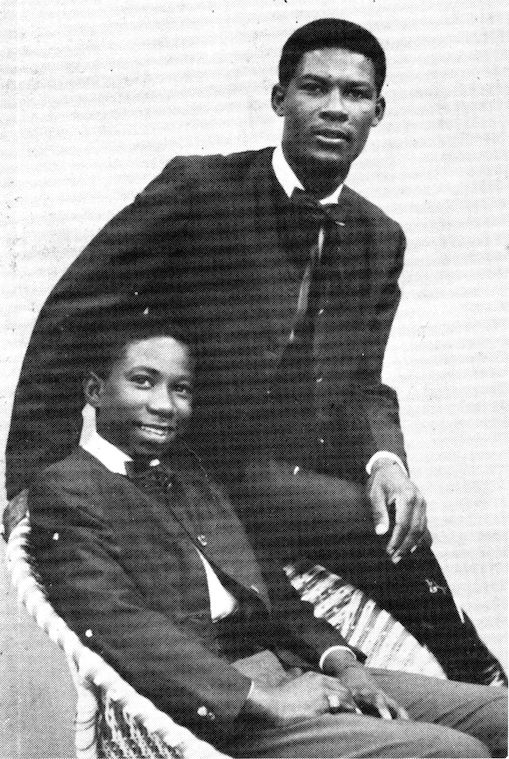The Claredonians
The Clarendonians initially comprised of two childhood friends, Fitzroy (Ernest) Wilson and Peter Austin, who began singing in local talent competitions around their home parish from where they took their name.
Their performance suitably impressed Duke Reid, who had them record ‘Muy Bien’ and ‘You Are A Fool’ for his Treasure Isle label in 1965. Soon after, they moved to Clement ‘Coxson’ Dodd‘s Studio One operation, where they remained for the next couple of years.
It is often stated that during this time Freddie McGregor was also a member of the group, but this is due to the fact that whenever Ernest wasn’t singing with Peter in the Clarendonians, he and Freddie would record together. As Fitzy & Freddie, the pair voiced such songs as ‘Do Good’, ‘Why Did You Do It’ and ‘Too Young To Love’, and through their association with Studio One, the three singers, individually and collectively, produced some of the most successful ska and rock steady singles of the 1960s.
Their spell with Dodd resulted in a legacy of hits such as ‘You Can’t Keep A Good Man Down’, ‘Darling Forever’, ‘Sho Be Do Be’ and ‘You Can’t Be Happy’. They are also credited for their rude boy hits with ‘Rude Boy Gone A Jail’ (sometimes credited as being recorded by the group with Desmond Baker) and ‘Rudie Bam Bam’. These hits and confusingly ‘Do Good’ were suitably compiled on ‘The Best Of The Clarendonians’Studio One LP, along with ‘Sunshine’, ‘He Who Laughs Last’, ‘Stand By Me’, ‘I Can’t Go On’ and ‘Goodbye Forever’
In addition to crediting many of the group’s records to the Clarendonians, several of their recordings were confusingly credited to the aforementioned Fitzy & Freddie as well as Freddie & Peter or to any of the three singers as soloists.
Following their departure from Studio One the group recorded with several producers, such as Blondel Calneck , for whom they cut a number of fine sides in 1968, including a version of the Four Tops’‘I Can’t Help Myself’, renamed ‘Baby Baby’, ‘Bye Bye Bye’, ‘Lonely Heartaches’, ‘I’ll Never Try’ and ‘I Am Sorry’.
Soon after, they reunited with Duke Reid who issued their superb double-sided 7′ single, ‘Funny’ c/w ‘I Am Yours Forever’,crediting the artist as the Soul Lads, while soon after issued the self-financed ‘Burning Fire’, ‘So Fine’ and ‘Deep Down In My Heart’ and ‘Take It Or Leave It’ on the Drum Beat label.
In 1969, a spell with Leslie Kong’s Beverley’s Records produced ‘A Day Will Come’ and the festival Song entry, ‘Lick It Back (Festival ’69)’, but over the next year or so,flitted from one producer to the next, working with the likes of Bunny Lee andPrince Tony (for whom they cut a popular version of Tony Allen’s oldie, ‘Night Owl’) and Byron Lee, who released the excellent ‘Walking Up A One Way Street’.
By now, Ernest Wilson was regularly performing as a soloist, occasionally recording as King Shark, and also worked briefly with the Techniques, while Peter Austin launched the Stud label on which he issued a series of gems crediting the Clarendonians, most notably ‘Darling Forever’, ‘Bound In Chains’, ‘Darling Forever’ and ‘Woman A Bawl’.
While Wilson continued to pursue his music career over the ensuing years, Austin eventually grew disillusioned with the business and concentrated on his career as an aviation supervisor at Norman Manley International Airport.
But in 1992, he was coerced from his premature retirement to reunite with his former singing partner to record the album, ‘You Can’t Keep A Good Man Down’ that featured remakes Studio One hits alongside an updated version of their solo disc, ‘Muy Bien’.
Meanwhile,Freddie McGregor achieved international success with the release of his debut album, ‘Bobby Babylon’ and later enjoyed international chart success with his interpretation of ‘Just Don’t Wanna Be Lonely’ and ‘Push Come To Shove’.
While the Parish of Clarendon is celebrated for introducing a number of top performers, such as Millie Small, Cocoa Tea and Barrington Levy, the trio of Freddie McGregor, Ernest Wilson and Peter Austin will always be quite rightly associated with putting the island’s third largest rural community firmly on Jamaica’s musical map.
Stephen Nye

